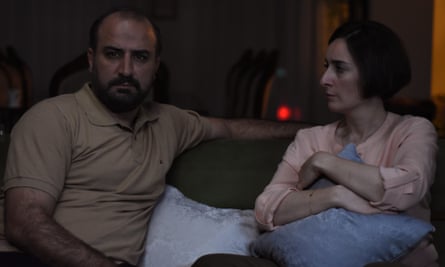Mohammad Rasoulof is a fugitive Iranian director and dissident wanted by the police in his own country, where he has received a long prison sentence and flogging. Now he has come to Cannes with a brazen and startling picture which, though flawed, does justice to the extraordinary and scarcely believable drama of his own situation and the agony of his homeland.
It’s a movie about Iranian officialdom’s misogyny and theocracy, and sets out to intuit and externalise the inner anguish and psychodrama of its dissenting citizens – in a country where women can be judicially bullied and beaten for refusing to wear the hijab.
The Seed of the Sacred Fig begins as a downbeat political and domestic drama in the familiar style of Iranian cinema, and then progressively escalates to something extravagantly crazy and traumatised – like a pueblo shootout by Sergio Leone.
Iman (Missagh Zareh) is an ambitious lawyer who has just been promoted to state investigator – one step short of being a full judge in the revolutionary court. He gets a handsome pay rise and better accommodation for his family: wife (played by actor and anti-hijab protester Soheila Golestani) and two student-age daughters (Setareh Malek and Mahsa Rostami).
But the promotion almost immediately brings disappointment and tension: Iman, a thoughtful and decent man, is stunned to discover that he is expected to rubber-stamp death-penalty judgments without reading the evidence. He is told that he must now be secretive with friends and family who could be threatened and doxed by criminal elements as a way of pressuring him.

Most fatefully of all, he is issued a handgun for his family’s protection, apparently without any training or guidance as to how to use or store it. Naive Iman casually leaves it lying around the house and tucks it in the back of his trousers like a Hollywood gangster. (Are Iranian prosecutors really allowed to be so casual with firearms?)
When the anti-hijab protests explode in Iran, whatever liberal scruples Iman once had are suppressed. He coldly rebukes his daughters over dinner for their rebellious feminist views and accuses them of falling for the propaganda of enemies and foreign elements. “What foreign elements?” his daughters demand – but Iman sullenly refuses to elaborate. (Here is a flaw in the film, surely – in real life, Iman would make some very specific, ugly, paranoid claims.)
When his wife and daughters help a terrified young female anti-hijab protester who has been shot in the face by the police, this too must be concealed from Iman. And then, catastrophe – Iman’s gun goes missing and, with increasing resentment and fury, he suspects one of the women of his family has taken it and is lying to him. His toxic outrage bleeds into the fabric of the film itself.
The Seed of the Sacred Fig starts out in the modern world of Instagram reels and YouTube, composed in the complex and oblique style that we have got used to in Iranian cinema in films by Asghar Farhadi: a world of subtle, realist implications that has arguably replaced the fashion in Iranian cinema for the poetic and the sublime. Rasoulof’s mysterious parable Iron Island from 2005 is a good example.
It is possible to watch this movie and initially assume (as I admit I did) that the obvious prime suspect for the gun-theft is not a family member and their refusal to mention the probable culprit’s name is a symptom of their unease at having widened the circle of trust to someone outside the family – an indication of their repression and groupthink dysfunction.
But no. The answer lies elsewhere and emerges almost casually as the drama evolves into something almost jaw-dropping. We get a car chase, violence, and a final demonstration of Chekhov’s rule about what happens to a gun produced in act one. And yes, perhaps the point is that The Seed of the Sacred Fig is a film to be finally understood in precisely those enigmatic, poetic and symbolic terms that looked to have been superseded in Iranian cinema – and that the realist depictions of what Iran has become are to be found in the smartphone footage being shared on social media. The film may not be perfect, but its courage – and relevance – are beyond doubt.
Source: theguardian.com





















